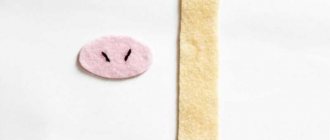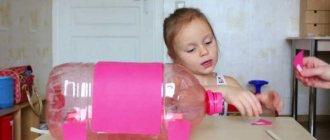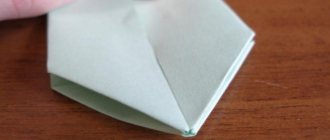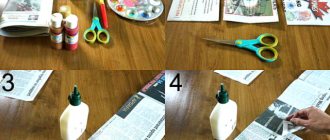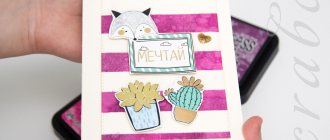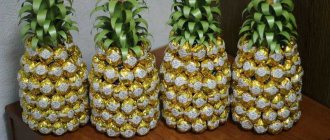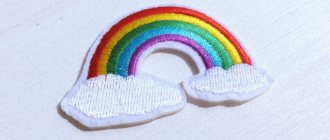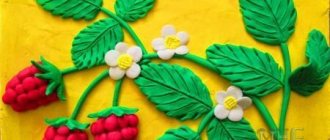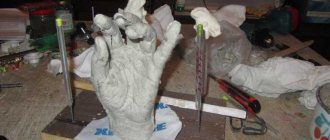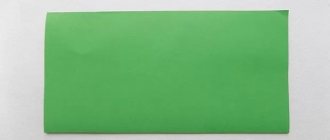For every mother, her baby is the most important, one and only. And everyone has little things dear to their hearts: tags from the maternity hospital, a baptismal shirt, a pacifier, etc. You need to keep these things along with your memories in a special place. Website “Mom can do anything!” I have collected 60 ideas for you to make your own mother's treasure boxes.
To make these boxes you will need the following materials:
- thick paper (for example, drawing paper);
- picture and inscriptions;
- ribbons and all kinds of decorations;
- double-sided bulk tape;
- glue moment crystal;
- stationery knife;
- patience and time (nowhere without them!).
Mom's treasures for a boy - step-by-step master class
For a mother, the simplest little things associated with a child can become the most valuable treasures in life, and as you know, treasures require decent packaging and there is nothing more interesting than creating a magic box with your own hands.
DIY mother’s treasures for a boy – master class
Required tools and materials:
- beer cardboard;
- white cardboard, craft cardboard;
- scrapbooking paper;
- pictures for decoration, brads, large button;
- fabric, padding polyester, elastic, ribbon;
- scoring board;
- stationery knife, scissors, ruler, glue, eraser;
- sewing machine.
Master class on making a mother's treasure box for a boy:
- We cut the beer cardboard into pieces of a suitable size.
- Cut the kraft paper into strips.
- We crease all the strips in the middle and cut off the corners.
- We form a box from beer cardboard, generously lubricating the edges with glue.
- Next, we sequentially reinforce the joints of the box with strips of kraft paper: first on the outside, then on the inside, and finally on top.
- To decorate the box, we will cut and sew paper parts. And then we will glue all sides.
- Then we will make the base for the lid from white cardboard. The lid needs to be quite large, so you can buy large sheets of cardboard or glue it together from several parts.
- We crease the cardboard (press the folds) - the lid should fit tightly around the box, but not be too tight.
- Now we will glue the padding polyester onto the lid and cover it with fabric and sew it.
- We sew on an elastic band that will become a holder for the lid.
- Let's make a layout on the lid - in this case you can use many colored elements, including not only pictures, but also paper as a backing.
- We complement paper decorations with brads, ribbons and stickers. We sew on the button so that the elastic holds the lid, but does not stretch too much.
- For the inside of the lid, we cut out and sew a paper part and a transparent plastic part.
- Now we’ll make a photo card from craft cardboard and scrapbooking paper.
- Let's move on to creating the boxes - they will be of three sizes.
- We cut off the excess, crease the folds and erase the markings.
- We glue the boxes (for reliability, you can fasten the boxes with clamps).
- We cover the sides of the boxes with paper (the paper elements should be 1 cm smaller than the sides).
- We decorate the details for the upper parts with inscriptions.
- 20. We form “tongues” from the ribbons and seal them with paper.
Finally, we glue the box to the lid and place it inside the keepsake box. The result is a box using the scrapbooking technique of mother’s treasures for a boy.
You can also make a wonderful photo album with your own hands using the scrapbooking technique.
The author of the master class is Maria Nikishova.
Source: https://womanadvice.ru/maminy-sokrovishcha-dlya-malchika-poshagovyy-master-klass
Scrapbooking
What is scrapbooking? This is an art that is handicraft, decorating something, even a simple box. The most important thing for scrapbooking is the desire to create, a flight of limitless imagination, the presence of diligence and love. If mom wants
, you still want to make your treasury of memories in the highest class, but you don’t have enough imagination, and this happens at the beginning, on the Internet you can find many templates with detailed descriptions that will help you create a masterpiece with your own hands, in which all the love for your child is invested.
In fact, there can be hundreds and thousands of cool ideas. You just have to look at your baby and ask yourself what special thing I want to do for him, what I want to dress up my memories of his carefree and so quickly passing childhood, what I want to remember in the future. Thoughts come by themselves.
But it happens that my mother has created so many beautiful products over the course of several years that it seems that this is the highest class, that nothing could be more unusual. Then you can use ideas from the Internet, which contains a huge amount
information about scrapbooking products for every taste. Such items have been collected from all over the world by professionals and amateurs, mothers, grandmothers, young girls who only dream of motherhood, but are already preparing for it, contributing to “mother’s treasuries.”
There is no identical fantasy in the world. Some people love the sea. This means that all ideas will be embodied in a marine theme and travel. Others prefer rare flowers. You can guess that the work will be devoted to rare, and perhaps not yet emerging plants
and flowers on the planet. Let's just say, flowers from the future. Some people love cars, so all the needlework will probably consist of real machine screws, nuts, and maybe even large parts. A great idea for those mothers who have sons.
Many people believe that to master this type of activity you need to spend a huge amount of money and purchase unimaginable items. In fact, this is not true. Most likely, every housewife has a lot at home
. For example, a box, buttons, scissors, glue, rhinestones, colored paper, stencils purchased for the child, cardboard, ruler, pencils, a piece of fabric, thread and needles. A novice mother only needs to purchase stamps, and, if desired, scrapbooking paper, beads, flowers, lace, in order to be sure to create a masterpiece of a true master.
Step-by-step master class on making a box “Mom’s Treasures” » Tatyana Bedareva
Every mother has little things dear to her heart that remind her of her baby’s sweet moments - tags from the maternity hospital, the first tooth, a lock of hair, the first photo - ultrasound, pregnancy test, belly button clip, socks, favorite rattle, etc. You can store your memories in a beautiful treasury, a box you made yourself. And now you will learn how to make a box for children’s things as a keepsake with your own hands.
This step-by-step master class with photos on making a box is suitable for beginners! Any mother can make such a box herself!
Ekaterina Lazutina
Author - Ekaterina Lazutina, happy mother and creative person. After the birth of my daughter, I began making wonderful boxes for mothers in which to put all the most important children's treasures! Thanks to a detailed master class on making a box with your own hands, you can also make it yourself or order one as a gift from Ekaterina’s group.
Inside
To make a box “Mom’s Treasures” with your own hands , you will need the following materials and tools: cardboard for the lid and base of the box (at least 1.5mm) cardboard for the inner boxes, padding polyester 22x23cm, fabric 26cmx41cm, paper for decoration - 2 sheets 30x30cm, PVA glue, double-sided tape ( optional) hot glue (you can replace moment crystal glue) moment crystal glue (or any other transparent) simple pencil ruler scissors set for decorating the box depends on your imagination in this master class I used - narrow ribbons (handles for small boxes) and wide (we tie the box into a beautiful bow using it), lace, a metal key and lock, a wooden clothespin, decorative paper flowers, decorative ribbon - a centimeter printed text (list of treasures, date of birth, height, weight, time of birth, baby's name) - you can write by hand or download inscriptions found freely available on the Internet.
- How to make a box “Mom’s Treasures” with your own hands : Cut out thick cardboard 15.5cmx22.5cm - 2 pieces, 5cmx22.5cm - 1 piece,
- padding polyester the same size as cardboard (15.5cmx22.5cm - 2 pieces, 5cmx22.5cm - 1 piece).
- Trying it on fabric (26cmx41cm)
Glue the padding polyester to the cardboard using moment glue
We lay the cardboard on the fabric with the padding pad glued inside, leaving a distance of 5mm between the parts for subsequent closing and opening of the lid. We wrap the fabric onto the cardboard (long sides first) using glue to fix the moment.
Carefully bend the corners, fix the moment with glue
After gluing the fabric around the entire perimeter, the following blank is obtained:
We glue the wide ribbons with instant glue - we will use them to tie our box
We cut out a piece measuring 22cmx23cm from decorative paper and glue it onto the inner lid of our future box with glue. We carefully draw the bend points with an old gel pen or any sharp object (a plastic knife for cutting plasticine
Source: https://teddy-love.com/poshagovyiy-master-klass-po-izgotovleniyu-korobochki-maminyi-sokrovishha.html
Box patterns
In order not to make a box pattern yourself, you can download and draw it on paper special for this purpose, Goznak. Or immediately redraw from the monitor.
In total you need to make 4 small boxes, one large and one base box. On the first sheet draw all the small boxes, on the second - the large ones.
When the drawings are completely ready, cut them out using a slanting knife on a rubber mat. It is worth paying special attention to the places where the arrows are drawn. In these places it is important to cut out the elements exactly along the main black lines so that the box closes well.
Read this: How to make a card with your own hands: a bouquet of flowers and a cute baby elephant
The result can be seen in the photo:
Small box:
Large pattern:
The basis:
Master class “Mom’s treasures”
Hello, my good ones!))))))))))
Yes, yes))) I finally filmed this long-awaited MK for you))
It turned out to be quite voluminous. but it’s not that easy either. Therefore, I tried to describe everything step by step and in detail.
Make yourself comfortable... let's begin))))))))))
1)
First you need to prepare the necessary tools and materials.
We will need:
- good attitude and self-confidence)) Don’t be discouraged if something doesn’t work out the first time. Everything will definitely work out from the second)) During the master class, we made such treasures with the girls in just 4 hours of pure time.
— 2 sheets of Goznak paper for drawing in A1 format. I highly recommend buying this kind of paper, since its quality and density are an order of magnitude higher than those of other companies. It is sold in regular office supplies. If you look at the light, you can see a watermark with “Goznak” written on it.
- It is also not necessary to buy such a large format of paper, but it is convenient for me to work with this.
- - beer cardboard 1.5 mm thick
- - a metal ruler, preferably at least 50 cm in length
- - regular ruler 30 cm
- - stationery knife
- creasing machine with a thin ball at the end (knitting needle, non-writing pen, etc.)
- - sharpened pencil
- - scissors
- — glue “Moment”
- - sewing or wide lace, about 102 cm
- - cotton or satin ribbon
- - cotton
- — padding polyester
- — scrap paper
- - decorations.
- 2)
Print out the drawings of our future boxes
We will need to make 4 small boxes 6x6x6 cm, 1 large box 12.3x6x6 cm and 1 base box 13x19x6 cm.
By carefully looking at the drawings, you can see not just the dimensions of the boxes, but also the marks on the ruler. Very!!!!
It’s convenient to draw boxes without setting each size anew and without moving the ruler each time.
Just make the necessary pencil marks where shown on the drawings (that's why a long ruler is needed). There are marks both horizontally and vertically.
In addition to the fact that this greatly simplifies the drawing process, we minimize future errors, which will in any case be caused by the thickness of the pencil and the divisions of the ruler.
3)
Draw rectangles on paper. On 1 sheet of A1 format there are 4 small boxes, and on the other - 1 large box and a base box.
We get 6 lined rectangles
4)
Using a stationery knife on a rubber mat, we cut off all excess along the bright black lines. Now I don’t draw out all the “ears” anymore. I immediately cut them off “by eye” with a knife.
Please note that at the bottom of the first two drawings the pencil line is literally 1 mm below the black line along which the paper is cut.
This is done so that when the paper is folded inside the box, it can be easily inserted inside.
Let's look a)
Let's see b)
There is one more important point that I would like to draw your attention to. On the vertical drawings we mark exactly 30.05 cm (30 cm and only half a millimeter!!!
). This action will prevent the lids of future boxes from falling inside.
On the base box we cut off the extra millimeter from 4 sides
As a result, our drawings after trimming look like this
A small box looks like this (don’t forget that there should be 4 of them)
The big box looks like this
And here is our base box
5)
Next, we use the red dotted lines. This is convenient to do with a regular and light wooden ruler.
6)
I fold the boxes using nail scissors. Very comfortable, and the edge is smooth and clear
Be especially careful when creasing the base box. The lines must be parallel to each other. The thickness of our box is 1.5 mm. That's why I always use cardboard 1.5 mm thick.
7)
Glue the boxes together. First, lubricate all 4 beveled “ears” with glue at once and glue them

We bend it inward and glue 2 even “ears” on top
9)
All that remains is to glue the last big, even “ear”))))))))))))))))
We should receive 4 ready-made small boxes and 1 large box
10)
Cut out 2 rectangles 18.7x6.7 cm and 2 rectangles 12.7x6.7 cm from beer cardboard
11)
Glue cardboard to the sides of the base box
12)
Glue one beveled “ear”
13)
Then the second
14)
Apply glue to the 2 remaining “ears” at once and quickly glue them one by one
15)
We bend it inward and glue the straight “ears” of the short sides
16)
Then the remaining “ears” of the long sides
And we get a ready-made base box. Beer cardboard should ideally fit into the walls of the drawing paper
17)
Cut out a rectangle 18.9 x 7 cm from drawing paper. We crease in the middle and cut at an angle of approximately 45 degrees from the creasing line
18)
Glue the resulting strip on the outer long side of the box
From the side of the spine it looks like this
19)
The disadvantage of this method with thick walls is that it creates unsightly corners.
20)
With the help of sewing or lace, we correct this moment. You need 2 cuts of 51 cm each.
On the spine side, we do not glue the sewing along the entire length.
21)
Now we can insert our boxes inside)
22)
From scrap paper we cut out 4 squares 5.8x5.8 cm, 1 rectangle 12.1x5.8 cm, 1 rectangle 12.1x1.8 cm, 4 rectangles 5.8x1.8 cm
23)
Make 5 loops from cotton ribbon
24)
I print out the inscriptions. We tint them around the edges.
25)
Glue scrap paper, loops, inscriptions and decorations
26)
We cut out the cover from beer cardboard: 1 rectangle 14x20.5 cm and 1 rectangle 13.7x20.5 cm.
The cover is 3 mm wider than the base!
It took a long time to arrive at these dimensions through experience))))))))))
We cut out a spine of 20.5 x 7 cm from drawing paper. Glue everything onto padding polyester. The gaps are approximately 5 mm.
27)
Covered with cotton. I used 2 types of Korean cotton
28)
We decorate our cover completely, attach all the necessary elements, sew buttons on the spine, and design the “back” if desired.
And only after the cover is completely ready, we first glue the base box to the lid using the remaining part of the strip of paper (like an album binding), and then glue the bottom of the base box. We do not glue the spine!!!
29)
We cut out a 13.8 x 19.9 cm rectangle from scrap paper and create a flyleaf. In total, it takes me 2 sheets of scrap paper 15x15 cm for such treasures
That's it)) our treasures are ready))))))))))))))
We enjoy the result and praise ourselves)))))))))))))
Thanks to Art Studio "Prosvet"
for providing a wonderful chipboard!)
Keep your kids' treasures safe and beautiful!)))))))))))))))
Thank you, Asya)
PS: when making mother’s treasures using this microscope, please provide a link to this post.
PSS: if the links are closed, add links in the comments. I’ll add them myself later)
Let’s show off and add your treasures here))))))))))))))
Source: https://asyamischenko.blogspot.com/2015/01/blog-post_9.html
Product assembly
Now further actions with the future box will be described step by step.
At the beginning of work, go along the dotted lines with a scoring line under a ruler.
Pay due attention to the base box: all lines must be clear parallels and perpendicular.
Then assemble the boxes, coating the “ears” with superglue.
The result should be four small boxes and one larger one.
Next, you need to cut out two parts 18.7 * 6.7 centimeters and two parts 12.7 * 6.7 centimeters from cardboard. Glue them to the sides of the base box.
Assemble it and glue it together. The end result should be a neat box. The cardboard should fit perfectly inside the walls.
Project “BABY” - Master class: Mom’s treasures from Ekaterina Alekseeva
Greetings to blog guests and readers!
The second stage of the thematic project “BABY” is already underway on our blog, and within the framework of this project, I, Ekaterina Alekseeva, prepared a master class.
I'll show you how I make Mom's Treasures,
. Nowadays, a lot of different master classes on this topic can be found on the Internet, I don’t claim any novelty, I just want to show how I do them.
- So, we will need:
- - binding cardboard;
- - watercolor paper or designer cardboard;
- - paper for scrapbooking, I used the new Bee Shabby “Baby” collection$
- — adhesive materials;
- - ribbon for ties;
- various decorations (lace, flowers, cutting, plaster stucco, chips, semi-pearls, etc.) - everything you like can be here; - metal corners.
The size of the finished box was 14*14 cm, height 7.5 cm. The dimensions of the internal boxes were 6*6 cm and height 5 cm.
I always start making my mom's treasures
from small inner boxes. For convenience, I have prepared a box template that I always use. Based on this template, by changing the dimensions of the blanks, you can always make one that is suitable specifically for your project.
Using this template from thick watercolor paper (250-300 g/m) or designer cardboard, we cut out the blanks for our future boxes (4 pieces).
For the bottom of the inner boxes, we cut out scrap paper blanks slightly smaller than the bottom (mine turned out to be 5.9*5.9 cm).
And glue it to the bottom of the boxes.
Then we collect the boxes and glue them together.
This is what we should get:
In order for our boxes to be easily opened, it is necessary to make convenient loops. Cut 4 pieces from a satin ribbon (or any other) of a suitable color and prepare 4 semicircles to secure them.
We make a slit in the middle of the lid of the box.
into which we insert our ribbon in the form of a loop
and glue it on the back side.
ATTENTION! We glue the tape not to the top of the lid, but to the “tail” by which the lid is held
I glue the semicircles prepared in advance on top of the tape for a more reliable fixation of the tape.
As a result, we get a neat loop that can be used to open the box if necessary.
And the finished 4 boxes:
When all the boxes are ready, we begin to make the outer box in which 4 small ones will be stored.
To do this, we leave all 4 boxes together and take the necessary measurements. The length of the inside of the box on one side is 12.6 cm. To this I add 3 mm (the thickness of my beer cardboard is 1.5 mm in double size).
The height of the box, taking into account the loops, was 6.3 cm.
- The total size of the box is 12.9 * 12.9 * 6.3 cm.
- We cut out the blanks from beer cardboard:
- 12.9*12.9 cm - 1 piece (bottom);
- 12.9*6.3 cm - 2 pieces (sidewalls);
- 12.6*6.3 cm - 2 pieces (sidewalls).
We glue the blanks, starting with the larger sidewalls, gluing them with the edges to the bottom.
When the box is glued, you can try it on the inner boxes.
Now let's start strengthening the walls of the future box.
To do this, cut strips about 3 cm wide from ordinary office paper and fold them in half.
We cover all the edges of the box inside with these strips.
and outside.
We cut out strips 10 cm wide from scrap paper and use them to cover the outside of the box.
Along the length of the paper there is a crease strip about 1.5 cm wide; it will bend to the bottom of the box.
First we glue the side parts, then the allowances that go to the bottom.
And then carefully glue the upper allowances.
This is what we end up with.
Next, we decorate our box inside. We measure the depth of the box: from the bottom to the top I get 6.35 cm. I will make the inside a little lower to make it nice.
We also select the appropriate paper to decorate the inside and cut out strips from it. The width of my strips turned out to be 7.7 cm (6.2 cm finished height + 1.5 cm allowance at the bottom).
We crease a strip 1.5 cm wide from the bottom, bend it and glue the strips inside the box.
Next, we measure the internal size of the bottom of the box, cut out a piece of suitable scrap paper of the required size (my dimensions are 12.4 * 12.4 cm).
At the stage of sealing the bottom, I added additional tape, with its help it will be convenient to remove small boxes from the large one.
This is what it will look like when finished:
We have the inner box ready, let's move on to the outer lid and bottom. Below I have given a diagram of how the inner box (indicated by pink lines) will be attached in relation to the outer one so that you can more clearly understand where the dimensions come from.
- And in accordance with these dimensions, we cut out blanks from beer cardboard:
- 13.5*13.8 cm - 2 pcs (lid and bottom);
- 13.5*6.5 cm - 1 piece (side part).
I like to make boxes of this kind in soft covers, but the lining is not padding polyester, but high-density fleece (390 g/m). It is more voluminous than usual, but at the same time it does not give that excessive plumpness that I do not like in padding polyester.
So, we lay out our blanks on the fleece and glue them to it, taking into account the additional distance that we will need so that the box can be easily opened and closed.
ATTENTION! My closing allowances are different. This is explained by the fact that the side part is rigidly fixed to the inner box and it will not open from below, so we don’t need a large allowance here.
We make it minimal, literally 3-4 mm, depending on the thickness of the beer cardboard used. The top cover, on the contrary, should open and close freely, so here I have an allowance of about 8 mm.
Trim off excess fleece
Next, as usual, we cover the workpiece with fabric. I won’t go into detail here, I think everyone knows how to do it)
When the workpiece is covered with fabric, we need to close the unsightly folds of the lid. For this I do not use paper, but a piece of fabric that was used to cover the cover. Ask why fabric? The main reason is that the fabric does not provide the thickness that paper will provide in any case. The bend area turns out to be very plastic and does not “stand like a stake”).
To glue the fabric, you can use special fabric glue or thick PVA; when it dries, it will not be visible.
To prevent our plump back from getting dirty, I like to make legs similar to boxes. I use large brads as legs.
Using an awl, I pierce the workpiece and fix the brads legs from the inside out.
With the same brads I fix the side part of our workpiece. You don’t have to do this, it’s more a matter of aesthetic perception than any constructive load or necessity.
Now we glue our ties to the workpiece. I decided to use a satin ribbon of a suitable shade for this. Glue it on the inside.
Next, we need to refine the inside of the lid, which will be visible when opening the box. We cut out a piece of scrap paper of the required size (my dimensions are 13.5 * 13.1 cm) and carefully glue it.
When our lid is completely ready, we glue our inner part into it. Let's start from the bottom.
I spread the glue quite generously, we need the box to stick very well to the lid, the excess can always be wiped off with a cloth.
And after the bottom we glue the side part.
I think our box will be constantly touched and examined, so I put the most vulnerable parts in metal corners.
Source: https://www.bee-shabby.ru/2015/09/baby-ekaterina-alekseeva.html
"Gluing the Treasury Pieces"
While preparing the materials, you carefully selected and selected the glue for the job. I offered to buy Erich Kraus glue, but someone replaced it with another one, maybe tested by you, or maybe just by guess. You will need to glue all the parts very carefully, Erich Kraus glue is also good, it has a drying time of 1 minute, you can aim first and then glue it, you will also be able to move it a little, but (!) after that it will no longer be possible to peel it off. Other glue dries quickly, may form voids (bubbles), or may go into waves. If you don't know glue, glue one part and see how it behaves: whether it glues well, whether there are any bubbles, or whether there are any waves. The glued box is the appearance of your work. When gluing, all corners and sides should converge without creating waves. NEVER glue by weight, this is the very first and main mistake of a crooked edge! When in weight, you can pick it up slightly without any effort. Only by gluing on a solid base do you get smooth sides and edges. And so let's get started, we will need: 1) Glue Erich Kraus 2) Your boxes
